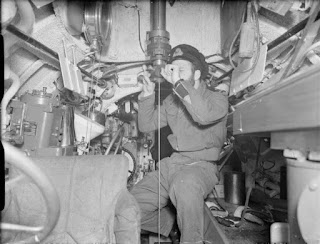Adm. (ret.) William H. McRaven believes in six special warfare principles of success. His theory of special operations, based on the six principles, can achieve "relative superiority" in combat.
 Forty years ago – 1978 – McRaven became a Navy SEAL. He achieved a pinnacle as a special operations warrior as commander of the United States Special Operations Command in August 8, 2011. That year he oversaw Operation Neptune's Spear that captured and killed Osamu bin Laden.
Forty years ago – 1978 – McRaven became a Navy SEAL. He achieved a pinnacle as a special operations warrior as commander of the United States Special Operations Command in August 8, 2011. That year he oversaw Operation Neptune's Spear that captured and killed Osamu bin Laden. Fifteen years before that operation McRaven wrote "Spec Ops: Case Studies in Special Operations Warfare, Theory and Practice" (Presidio Press, 1995).
The book uses six World War II case studies and two events in the 70s, written with clarity, detail and suspense, Tom Clancy-like, to illustrate how and why the theory of special ops works. Small teams, following the six principles, can prevail despite fortifications, in the face of greater numbers, and despite the inevitable hardships and challenges facing attackers.
"The theory states that special operations forces are able to achieve relative superiority over the enemy if they prepare a special plan, which is carefully concealed, repeatedly and realistically rehearsed, and executed with surprise, speed and purpose. Once relative superiority is achieved, the attacking force is no longer at a disadvantage and has the initiative to exploit the enemy's defenses and secure victory. Although gaining relative superiority does not guarantee success, no special operation can succeed without it. Consequently, by demonstrating how special operations forces achieve relative superiority, the theory can help explain the success or failure of a mission."
 McRaven channels thinkers and theorists like Herman Kahn, B.H. Liddell Hart and especially Carl von Clausewitz. Frictions, as described by Clausewitz, can be minimized if a team applies McRaven's six principles: simplicity, security, repetition, surprise, speed and purpose.
McRaven channels thinkers and theorists like Herman Kahn, B.H. Liddell Hart and especially Carl von Clausewitz. Frictions, as described by Clausewitz, can be minimized if a team applies McRaven's six principles: simplicity, security, repetition, surprise, speed and purpose.- Simplicity: Less is more. Limit objectives. Incorporate intelligence and be agile and open to innovation.
- Security: Conceal timing and details/methods of the operation.
- Repetition: "Routine hones those tactical skills to a degree that allows quick reaction to a threat..."
- Surprise: Deception causes confusion. Timing needs to be carefully planned to take maximum advantage of the enemy's vulnerabilities.
- Speed: Relative superiority is achieved in the first few minutes of an operation. Time is measured in seconds and minutes.
- Purpose: "Purpose is understanding and then executing the prime objective of the mission regardless of emerging obstacles or opportunities." Two aspects of purpose: It's clearly defined (focused) and there's personal commitment by all participants.
 |
| A German DFS 230 glider, used in special operations in World War II. |
 In the execution phase he takes us inside British X-craft midget submarines, aboard German WWII giant glider planes and into dictator Idi Amin's Uganda.
In the execution phase he takes us inside British X-craft midget submarines, aboard German WWII giant glider planes and into dictator Idi Amin's Uganda.The Raid on Entebbe and the attack on Germany's battleship Tirpitz, are edge-of-the-seat highlights in this book that demonstrates the need for reasoning and critical thinking.
We read about Adm. John S. McCain II being notified of a raid on Son Tay POW camp on Nov. 21, 1970, during the Vietnam War. One hundred and sixteen aircraft participated in the attempt to rescue POWs thought to be at the camp just west of Hanoi. U.S. Navy ships of Carrier Task Force 77 provided a textbook diversionary raid:
"It is estimated that twenty SAMs (Surface to Air Missiles) were fired at the force, but no casualties were sustained. It was later reported that 'the density of the Navy operations in the Gulf of Tonkin [during the Son Tay raid] was the most extensive Navy night operation of the SEA [Southeast Asia] conflict.'"
 |
| Yoni Netanyahu, hero of Entebbe rescue. |
"One of the Israelis, Amir, was the first man into the terminal. He penetrated through the second door of the main hall. inside was a large, well-lit room where all the hostages were lying on the floor. A terrorist, who had been lying on the other side of the door, fired a burst from his Kalashnikov but miraculously missed Amir. Amir returned fire. His rounds sliced through the door and killed the terrorist instantly. As trained, Amir turned right and cleared his side of the room. Behind Amir came another commando, who turned left and picked up coverage on the other side of the room. As the second commando entered, he saw two terrorists lying on the floor to his left, their rifles trained on Amir. Immediately he fired and both terrorists were killed."
 |
| A British captain aboard an austere X-craft mini submarine. |
Early in "Spec Ops" he makes a key point about sustaining relative superiority. "The ability to sustain relative superiority frequently requires the intervention of courage, intellect, boldness and perseverance, or what Clausewitz calls the moral factors."
McRaven shows how the lessons of history apply to strategy and tactics to educate future generations.
After his distinguished career, Adm. McRaven served from 2015 to 2018 as the chancellor of The University of Texas System. He is the author of "Make Your Bed," featured last year on Navy Reads.
No comments:
Post a Comment